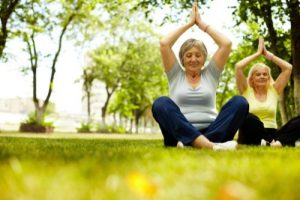
The primary reason for these symptoms is the decline in estrogen levels. Some of the significant signs seen are night sweats, hot flashes, mood changes, and cognitive changes.
Below are some of the latest articles Bel Marra Health has compiled to keep you informed and help you manage menopause-related symptoms.
Yoga for Menopause: Benefits and Poses That Help Manage Symptoms
Menopause comes with various woes, and while hormone replacement therapy is one way to deal with the symptoms, doctors now recommend yoga for menopause.
Menopause is a phase of life that women go through during which they become infertile and stop menstruating. Changing hormone levels in menopausal women often lead to symptoms such as weight gain, hot flushes, night sweats, mood fluctuations, difficulty focusing, problems sleeping, and cognitive changes such as difficulty learning and forgetfulness.
Menopause may also increase the risk of complications such as cardiovascular disease, osteoporosis, urinary incontinence, and in some cases, breast cancer. In order to minimize these risks, doctors recommend exercising and eating a balanced diet rich in fiber, unsaturated fats, and omega-3 rich foods such as fish. Lately, yoga has been a prescribed to manage the symptoms. Continue reading…
Menopause headaches are hormonally induced headaches experienced by women entering menopause—the phase of life where middle-aged women start to lose their fertility. It is more common among women who experienced headaches near their menstrual period. These headaches are associated with the increase and decrease in hormone levels. While some women may experience relief during menopause, others may experience pain that could be debilitating.
Headaches during menopause can take three forms—migraines, tension headaches, and sinus headaches. The most intense of these are migraines that typically cause pulsating pain on one side of the head and sometimes is accompanied by nausea. Headaches of moderate intensity are tension headaches due to stress, and sinus headaches are caused by inflammation or congestion. Continue reading…
Menopause sleep problems or menopause and insomnia often go hand in hand. This major change in a woman’s life is marred by several hormonal, physical, and emotional changes that often affect the amount of sleep a woman gets, as well as sleep quality.
The technical diagnosis of menopause is defined as a full year passing since a woman’s last menstrual period. The periods before and after this period are referred to as perimenopause and post-menopause, respectively. It is during perimenopause that a woman’s ovaries begin to underproduce several key hormones, particularly estrogen and progesterone, causing many of the symptoms seen in menopausal women. Continue reading…
Menopause and depression are generally two separate conditions that have more in common than you might think. This period in a woman’s life, going from a reduction in menstrual periods to when menstruation stops entirely, was found to predispose them to be twice as likely to suffer from the symptoms of depression compared to men, according to researchers from Harvard University.
Additionally, women far into their post-menopausal years with a past history of depression or who have suffered from server premenstrual syndrome (PMS) appear to be at significantly higher risk for developing symptoms of depression as well. Continue reading…
Menopause signifies the natural ending of a woman’s menstruation. With it, there are many symptoms, including fatigue and hot flashes. However, there are essential oils for menopause that may help during this phase of life.
Menopause is defined by 12 consecutive months passed without a menstrual period. The majority of women experience menopause during their 40s and 50s; however, it is not unheard of for some women in their 30s to experience menopause. The symptoms that come with menopause can be uncomfortable, so many women look for quick, safe relief.
While there are different treatments for menopausal symptoms, including hormone replacement therapy and low dose antidepressants, many traditional measures can come with strong side effects. For those who want a more natural way to relieve symptoms of menopause, essential oils are an option. Continue reading…